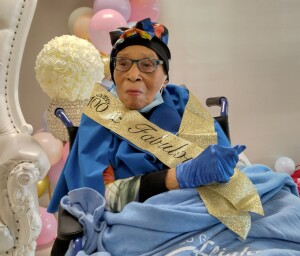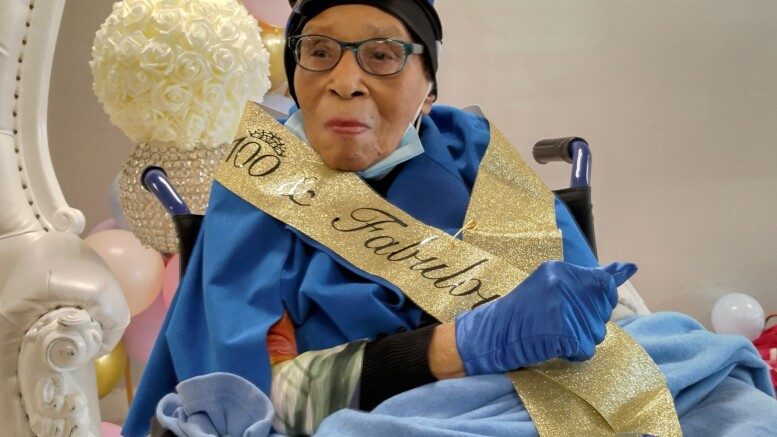
Anna Mae Robertson celebrates her 100th birthday in March 2024. She is one of the members of the Six Triple Eight, the only all-Black Women’s Army Corps unit stationed overseas during World War II. Their story is now a feature film for Netflix produced and directed by Tyler Perry. Photo by La Risa Lynch
Milwaukee – Anna Mae Robertson, who served in the storied postal battalion that helped raise morale among battle-weary World War II soldiers in Europe, died May 31.
She was 101.
Robertson’s death comes two months after the Six Triple Eight, the only all Black Women’s Army Corps battalion to serve overseas, was awarded the Congressional Gold Medal, one of the highest civilian honors awarded in the United States.
The honor came late in life – more than 80 years — for Robertson and the other 855 who made up the battalion. Robertson was to be presented with her medal this month during an event at her church, Tabernacle Community Baptist Church. Now the church will host a public homegoing service for Roberston. A date has yet to be set.
The little-known story of the Six Triple Eight was immortalized in a Tyler Perry-directed film of the same name. It starred Kerry Washington as Army Major Charity Adams, who commanded the group to accomplish a herculean task that the Army expected them to fail.
The women in the Central Postal Directory battalion were charged with clearing a nearly three-year logjam of mail destined for soldiers fighting in Europe, desperate to hear from home. The mail sat piled ceiling-high in sacks in a dark and damp warehouse. The Army gave them six months to clear it.
They were given no guidance on how to do to accomplish the task, so the women devised their own system. They even developed a system to identify some of the mail’s recipients because some letters were just addressed to “John Smith.”
But under Commander Adams, Robertson and the women cleared the backlog in 90 days. With the slogan “No Mail, Low Morale,” the unit worked 24 hours a day, processing an average of 195,000 pieces of mail in three eight-hour shifts.
But their achievement nearly didn’t happen. Civil rights activists Mary McLeod Bethune and First Lady Eleanor Roosevelt advocated for Black women to serve overseas. Eventually, the Six Triple Eight were sent to England in 1945.
And even though they served their country with honor and distinction, they faced a double threat. They had to work under the threat of enemy fire, discrimination, and unfair treatment from white military personnel.
“Regardless how poorly they were treated, they felt it was important enough that they represent their race and show, as Black women, we can get the job done,” Sheree Robertson said in a 2024 interview with the Journal Sentinel.
Robertson and the women excelled, processing more than 17 million pieces of mail in three months, breaking all Army records for sorting mail. The women repeated the feat in France, where they were sent to clear a similar backlog.
Robertson was a woman ahead of her time
Robertson was a woman ahead of her time. At 19, she joined the Army in 1943 along with her brother after their mother died. Her brother, Zeredee Griffin, joined the U.S. Navy. Robertson joined the Women’s Army Corps.
But Robertson’s decision to join the military went against norms for Black women of that era. Most Black women were relegated to domestic work. Instead, Robertson decided to cut her own path right into the annals of history.
“That takes a lot of courage,” said Denise Muhammad, one of Robertson’s daughters in a July 2022 Journal Sentinel article. “When she did that it wasn’t because there was this big push or a movement saying, ‘We want more women to be in the military.’”
Black Americans’ contributions in military service have often been overlooked
The contributions of Black Americans in military service have often been overlooked. But Six Triple Eight’s recognition is long overdue. In 2018, a monument was erected in their honor at the Buffalo Soldiers Monument Park at Fort Leavenworth in Kansas. The monument lists the names of 500 battalion members and includes a 25-inch bronze bust of Adams.
For Roberston’s service, she was awarded the Women’s Army Corps Medal, American Campaign Medal, European-African-Middle Eastern Campaign Medal, World War II Victory Medal, and the Honorable Service Lapel Button WW2.
The battalion was featured in a 2019 documentary, “The Six Triple Eight,” directed and produced by Wisconsin native James Theres, long before Perry’s film.
But a chance encounter between a family friend of the Robertsons and the actress Kerry Washington brought them together. Washington was in Milwaukee in October last year, campaigning for then-presidential candidate Kamala Harris, when that family associate and others facilitated the meeting between the two. The actress visited with the family at their northside home.
Sheree Robertson recalled the meeting in that 2024 interview with the Journal Sentinel.
“Ms. Washington expressed words of gratitude for the sacrifices she made while serving her country in World War II,” Robertson said.
While Robertson quietly made history, to her eight children she was just a mom. Robertson, who moved to Milwaukee after the war, made sure her children understood the value of education, knew the Lord and encouraged them to be anything they wanted as long as they worked hard for it. Roberston was married to John D. Robertson. He died in February 1983.
“My mother was a hard worker,” said Dawn Robertson in a March 2022 Journal Sentinel article. “She had strong educational values. She’s a quiet warrior that takes care of business. She took care of business in the military. She took care of business at home. She’s just a phenomenal woman.”

Be the first to comment on "Anna Mae Robertson: one of the surviving members of the all-Black women Six Triple Eight Postal Battalion dies"